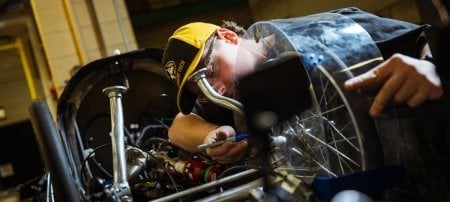Swapping Copper for Aluminum: Senior Design Study Could Help Automakers Lighten the Load

Federal regulations are challenging automakers to wring as many miles as possible from every drop of fuel, and one of the easiest ways to do that is to make lighter vehicles. Last year, one of the world’s leading auto industry suppliers enlisted a Senior Design team at Michigan Technological University to help it do just that.
For its efforts, the team earned first place in the Senior Design category at the University’s Design Expo 2015.
Industry giant Yazaki has been considering a switch from copper to aluminum in its wiring harnesses. A changeover could slash materials costs and cut the harnesses’ weight by 50 percent, but that’s only half the story.
“Aluminum has one-third the density of copper and similar conductivity, but there’s the problem of corrosion,” said Stephen Kampe, chair of materials science and engineering at Michigan Tech. “Copper has corrosion problems as well, but the auto industry has been using copper since Henry Ford, so everyone knows how to manage it.”
To learn more about managing aluminum, a Senior Design team from the Department of Materials Science and Engineering focused on what might happen in an automotive fuse box if the housing were to fail and salt spray from wet roads splashed onto the wiring.
“The students did with aluminum what Yazaki does with copper,” said Kampe, who advised the team. “They set up experiments to evaluate the galvanic corrosion rate of aluminum with various plating materials.”
Tin turned out to be most promising, he said, adding, “and that’s what Yazaki does, plate copper with tin to assist in soldering, so they could look at assimilating aluminum into their existing process.” However, he stressed that it was too early to draw any firm conclusions.
“People do these studies over years,” Kampe noted. “The team’s biggest contribution was setting up a mechanism to evaluate the corrosion behavior of aluminum.”
Partners at Yazaki North America were enthusiastic about the team’s progress. “We hope to continue our relationship with Michigan Tech to sponsor more senior projects,” said Matt Baker, senior engineer. “Yazaki gets the chance to have research conducted on things we may not have time to test on our own while providing the students a great learning opportunity. I look forward to working with more students in the future.”
The team members for the project, “Aluminum Corrosion Study—Automotive Electrical Systems,” were Annie LeSage, Alexandra Glover, Kyle Myszka and Jacob Gerdt.
Michigan Technological University is an R1 public research university founded in 1885 in Houghton, and is home to nearly 7,500 students from more than 60 countries around the world. Consistently ranked among the best universities in the country for return on investment, Michigan's flagship technological university offers more than 120 undergraduate and graduate degree programs in science and technology, engineering, computing, forestry, business, health professions, humanities, mathematics, social sciences, and the arts. The rural campus is situated just miles from Lake Superior in Michigan's Upper Peninsula, offering year-round opportunities for outdoor adventure.




Comments